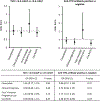Preconceptional antithyroid peroxidase antibodies, but not thyroid-stimulating hormone, are associated with decreased live birth rates in infertile women
- PMID: 29102040
- PMCID: PMC8129952
- DOI: 10.1016/j.fertnstert.2017.08.026
Preconceptional antithyroid peroxidase antibodies, but not thyroid-stimulating hormone, are associated with decreased live birth rates in infertile women
Abstract
Objective: To study whether preconceptual thyroid-stimulating hormone (TSH) and antithyroid peroxidase (TPO) antibodies are associated with poor reproductive outcomes in infertile women.
Design: Secondary analysis of data from two multicenter, randomized, controlled trials conducted by the Reproductive Medicine Network of the Eunice Kennedy Shriver National Institute of Child Health and Human Development. Multivariable logistic regression analyses were performed to assess the association between preconceptual TSH levels and anti-TPO antibodies.
Setting: Not applicable.
Patient(s): Serum samples from 1,468 infertile women were utilized.
Intervention(s): None.
Main outcome measure(s): Cumulative conception, clinical pregnancy, miscarriage, and live birth rates were calculated.
Result(s): Conception, clinical pregnancy, miscarriage, and live birth rates did not differ between patients with TSH ≥2.5 mIU/L vs. TSH < 2.5 mIU/L. Women with anti-TPO antibodies had similar conception rates (33.3% vs. 36.3%) but higher miscarriage rates (43.9% vs. 25.3%) and lower live birth rates (17.1% vs. 25.4%) than those without anti-TPO antibodies. Adjusted, multivariable logistic regression models confirmed elevated odds of miscarriage (odds ratio 2.17, 95% confidence interval 1.12-4.22) and lower odds of live birth (oddr ratio 0.58, 95% confidence interval 0.35-0.96) in patients with anti-TPO antibodies.
Conclusion(s): In infertile women, preconceptional TSH ≥2.5 mIU/L is not associated with adverse reproductive outcomes; however, anti-TPO antibodies are associated with increased risk of miscarriage and decreased probability of live birth.
Clinical trial registration number: PPCOS II NCT00719186; AMIGOS NCT01044862.
Keywords: Antibodies; autoimmunity; infertility; pregnancy; spontaneous abortion; thyroid.
Copyright © 2017. Published by Elsevier Inc.
Figures
References
-
- van den Boogaard E, Vissenberg R, Land JA, et al. Significance of (sub)clinical thyroid dysfunction and thyroid autoimmunity before conception and in early pregnancy: a systematic review. Hum Reprod Update. 2011;17(5):605–619. - PubMed
-
- De Groot L, Abalovich M, Alexander EK, et al. Management of thyroid dysfunction during pregnancy and postpartum: an Endocrine Society clinical practice guideline. J Clin Endocrinol Metab. 2012;97(8):2543–2565. - PubMed
-
- Negro R, Schwartz A, Gismondi R, Tinelli A, Mangieri T, Stagnaro-Green A. Increased pregnancy loss rate in thyroid antibody negative women with TSH levels between 2.5 and 5.0 in the first trimester of pregnancy. J Clin Endocrinol Metab. 2010;95(9):E44–48. - PubMed
-
- Colicchia M, Campagnolo L, Baldini E, Ulisse S, Valensise H, Moretti C. Molecular basis of thyrotropin and thyroid hormone action during implantation and early development. Hum Reprod Update. 2014;20(6):884–904. - PubMed
-
- Hollowell JG, Staehling NW, Flanders WD, et al. Serum TSH, T(4), and thyroid antibodies in the United States population (1988 to 1994): National Health and Nutrition Examination Survey (NHANES III). J Clin Endocrinol Metab. 2002;87(2):489–499. - PubMed
Associated data
Grants and funding
- U10 HD039005/HD/NICHD NIH HHS/United States
- U10 HD077680/HD/NICHD NIH HHS/United States
- U10 HD055936/HD/NICHD NIH HHS/United States
- U10 HD055925/HD/NICHD NIH HHS/United States
- U10 HD038998/HD/NICHD NIH HHS/United States
- U10 HD055944/HD/NICHD NIH HHS/United States
- U10 HD038992/HD/NICHD NIH HHS/United States
- U10 HD077844/HD/NICHD NIH HHS/United States
- R01 HD029834/HD/NICHD NIH HHS/United States
- U10 HD027049/HD/NICHD NIH HHS/United States
- R25 HD075737/HD/NICHD NIH HHS/United States
- U10 HD055942/HD/NICHD NIH HHS/United States
LinkOut - more resources
Full Text Sources
Other Literature Sources
Medical


